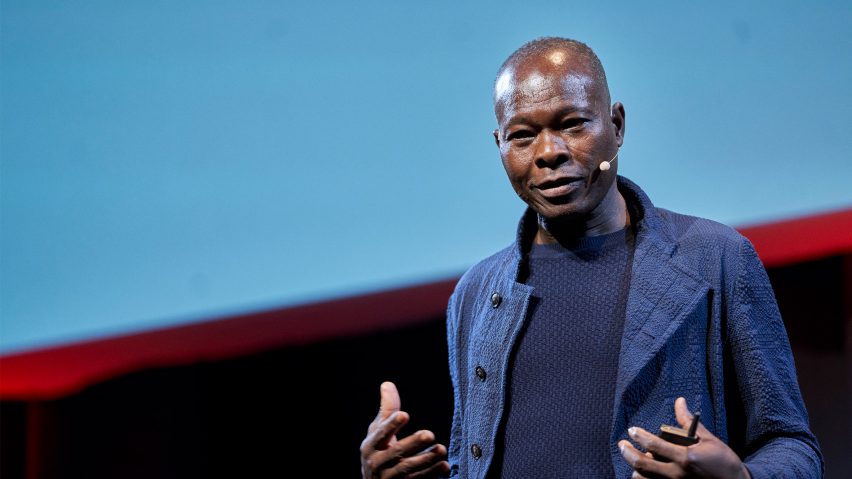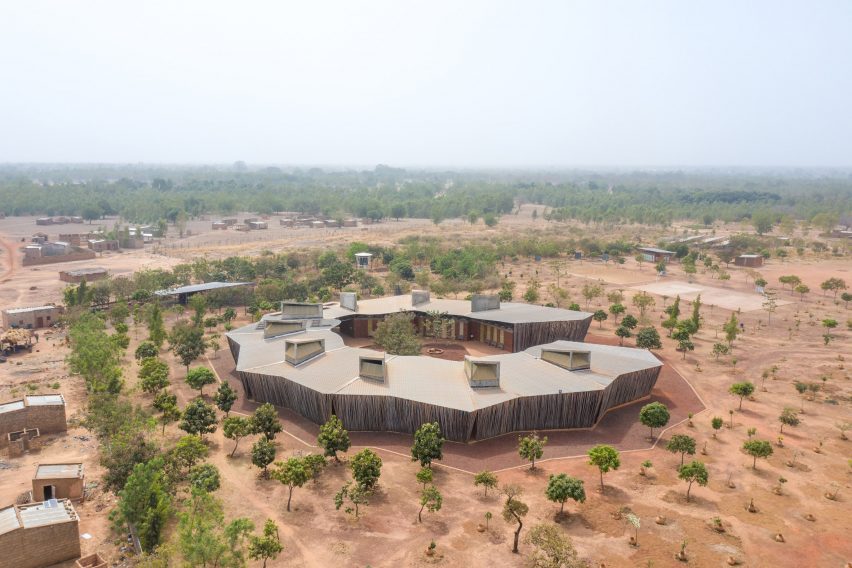
Pritzker "has given me courage" says Diébédo Francis Kéré
Pritzker Architecture Prize-winner Diébédo Francis Kéré may be known for his resource-light community buildings but would be open to designing a skyscraper when the time is right, he tells Dezeen in this interview.
Burkinabè architect Kéré has risen to become one of the profession's biggest stars in recent years, becoming the first African to win its most prestigious award in 2022.
Last week, he was also named by the Japan Art Association as the 2023 architecture laureate for the Praemium Imperiale awards.
Pritzker win "encouraged me to do more"
Speaking to Dezeen at the UIA World Congress of Architects in Copenhagen, Kéré reflected on how his Pritzker success has influenced his practice.
"It has encouraged me to do even more in the [same] direction – so to be more engaged and to push the ideas that I had further," he told Dezeen.
"It has changed, yes; it has given me a courage to keep doing what I started to do – what I love to do – with intensity, and more joy, because the recognition is there."
Kéré's work is often associated with sparing use of resources and clever responses to local climate conditions.
His portfolio is mainly made up of socially conscious projects such as schools, health centres and community buildings, with buildings completed in several African countries.
Among his more high-profile projects is the new parliament building for his native Burkina Faso, as well as a new parliament for neighbouring Benin.
He was also commissioned to deliver the Serpentine Pavilion in London in 2017.
"It is important to keep awarding quality"
Kéré believes it is important for the big architecture prizes to continue recognising different types of architects.
"I will say it is important to keep awarding quality, no matter what it is – you know, just to see the range of the work in architecture and then within that select quality to award," he said.
"It is an important engine to allow quality to keep growing and not coming from a given group, but then to look at architecture in its entire form and really give the award for quality."
"And quality may have different faces – is it related to sustainability? Is it related to comfort? Is it related to a big inspiration?"

During a keynote address at the UIA conference, Kéré revealed that since his Pritzker win he has been approached to take on residential projects for wealthy clients.
He laughed when asked if we will ever see a Kéré skyscraper emerge on the New York skyline.
"Okay, for that I have to say I'm very open," he said. "You know, architecture is very broad, it's open."
"If there is a tower that I can do, and it makes a difference and makes me happy, and makes me introduce something that is new and fresh, and people get inspired, and the client is overwhelmed, I will go for it."
"But I don't fight to have it," he added. "I will go for it when the time is right, but I'm not dying to start to build a skyscraper, no."
"I want us to be more atelier-like"
Having trained as a carpenter in Burkina Faso, Kéré studied architecture at the Technical University of Berlin, and his studio, Kéré Architecture, is now based in the German capital.
Based on his experience of working in both Africa and Europe, he believes that architects should be more in touch with the process of constructing buildings.
"We're getting more and more critical about the way we build and the way that the thinking of architecture is separated from the making of architecture," he said.
"I think we have to really connect more to the making of the buildings," he added. "Those 'thinking' buildings are often separated – some other people take it and just make it happen."
"I want us to be more atelier-like. Really go and check the material and be connected to the process of the making, but not to be isolated," he continued.
"The process is always something that is giving you something back, that will really foster your creativity."
As for the other major issues facing the built environment, such as climate change, Kéré suggested these are now well-understood but not yet subject to enough of a response.
"We're working in a way about climate change that is real, and we are also aware of the resource limitation that goes with it, we are aware of creating affordable housing in urban areas, but I think that we have to take more action," he said.
"That is what I want to highlight. We know about it in theory, but I think we're not taking action just to get these solved."
The main photo is courtesy of UIA World Congress 2023.
Dezeen In Depth
If you enjoy reading Dezeen's interviews, opinions and features, subscribe to Dezeen In Depth. Sent on the last Friday of each month, this newsletter provides a single place to read about the design and architecture stories behind the headlines.